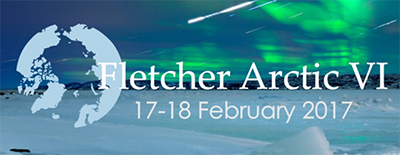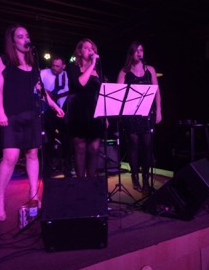More 2016-2017 Annual Reports
I’ve got some more Annual Reports, to add to last week’s post about the Fletcher Social Investment Group! This collection of only four reports provides a nice sense of the scope of student activities — from the opportunity to sing with a band, to formal conferences, to new student-developed initiatives.
Fletcher Africana Conversation Series
During the Spring 2017 semester, a team of students launched a new initiative called the “Fletcher Africana Conversation Series.” The series, entitled Securing Africa’s Future, addresses unconventional security issues faced by Africa, including those arising from threats to cross-border security and a shift in the continent’s economic trajectory. The primary goal of the series is to explore whether the continent has an opportunity to realize a new paradigm for its growth and prosperity in the coming years. For each event, the team invites a group of experts, practitioners, and professionals to The Fletcher School to participate and lead the conversation. This new initiative, designed to maximize audience participation and to integrate the wider Tufts University community, has been supported by Tisch College, the World Peace Foundation, the Institute for Global Leadership, and the Tufts University Africana Center. It is an offshoot/affiliate of the Fletcher Africana Club, and a legacy of the former Africana Conference. The goal is to provide regular Africana programming beyond the options in the curriculum for students who are interested.
 Fletcher Arctic Conference
Fletcher Arctic Conference
The sixth annual Fletcher Arctic Conference, hosted on February 17 and 18, focused on sustainable development in the high north and continued The Fletcher School’s tradition of convening diplomats, politicians, business people, academics and students to discuss pressing challenges and emerging opportunities facing the Arctic region.
The Arctic is increasingly attracting international attention and investments as climate change makes resources more accessible and Arctic maritime transportation a reality. The dynamics of globalization have fundamentally transformed the lifestyles of the Arctic’s 4 million inhabitants. This year, the Fletcher Arctic Initiative decided to explore potential pathways for prosperous and healthy livelihoods in the region.
The conference drew over 200 attendees and topics covered included Climate Change Mitigation, Resilience and Adaptation; Exercising Leadership in a Globalizing North; and Innovation for the UN Sustainable Development Goals. Participants heard from expert speakers, including Natan Obed, President of Inuit Tapiriit Kanatami (ITK), the largest Inuit association in Canada; Daley Sambo Dorough, F91, Vice Chairperson of the UN Permanent Forum on Indigenous Issues; and Ambassador David Balton, Deputy Assistant Secretary for Oceans and Fisheries and the Senior U.S. Arctic Official.
Besides the more than 30 experts convened at the conference, attendees also had the chance to hear from four Fletcher graduate researchers on the Early Career Scholars Panel. Last year’s conference chair, Molly Douglas, F16, presented on coordination of economic development activities in the Arctic for sustainability and Matt Merighi, F16, CEO of BlueWater Metrics and Assistant Director of the Fletcher Maritime Studies Program, presented on the challenges and opportunities for ocean data collection. In addition, MIB candidate Nathan Cohen-Fournier, F17, co-chair of the Fletcher Arctic Initiative, presented his recently completed study on Entrepreneurship in Inuit communities of Northern Québec. Finally, Max McGrath-Horn, F17, co-chair of the Fletcher Arctic Initiative, presented his forthcoming paper in Polar Geography comparing governance mechanisms in the Arctic and Amazon basins.
Fletcher Arctic VI continued a tradition of convening the brightest minds on Arctic issues to present and discuss opportunities and challenges facing the region. As the region continues to develop, more attention will be needed from policy makers, diplomats and academics. The Fletcher School is preparing its students to face these coming challenges, and will build on the momentum generated by this year’s conference.
Humanitarian Action Society
The Humanitarian Action Society (HAS) provides a network and forum for students interested in humanitarian affairs to explore these issues through discussions with experts in the field, skill-building opportunities, and networking with other students. The group serves as a platform to discuss current issues in the humanitarian space, as a link to external resources, and as a network though which students can explore career opportunities.
This year, HAS prioritized strengthening its relationships with the Friedman School of Nutrition and Science Policy and the Feinstein International Center, and coordinated with both institutions to ensure our members are welcome at events organized across campuses. We hosted talks with experts in the field on the ethics of humanitarianism and the securitization of humanitarian assistance, and organized skill building workshops on conflict sensitive interviewing and IRB applications for research proposals in complex settings. We also annually coordinate student participation in the humanitarian simulation for Professor Maxwell’s “International Humanitarian Response” course. During the D.C. Career Trip, HAS works with other student groups to coordinate a happy hour for current students and alums focused on humanitarian work, human rights issues, and migration. The club has also organized tailored site visits for students interested in particular humanitarian organizations.
This semester HAS began a series of student forums — lunchtime discussions tapping into the expertise of our peers and their experiences in the humanitarian space prior to coming to Fletcher. The forums have been successful and showcase the knowledge and expertise of our fellow classmates, as well as open opportunities to discuss diverse issues like sexual- and gender-based violence in humanitarian settings and refugee resettlement policies. HAS looks forward to continuing the exchange of ideas among our own students, as well as with groups from Friedman and Feinstein, and offering more skill building exercises next year!
 The Los Fletcheros
The Los Fletcheros
The Los Fletcheros, a Fletcher institution and student-run cover band, perform roughly six face-melting shows per year. Ranging from seven to 15 members, and playing diverse tunes ranging from the Beatles to Sia, the band auditions musicians every fall, and rehearse once a week throughout the year. Supportive classmates attend (at minimum) Halloween, Holiday, and Ski-Trip shows, dancing (in-time when possible) their hearts out to the music. Whether you’re a marvelous musician or a dazzling dancer, attending the Los Fletcheros shows always promises to be a rip-roarin’ good time.